Summer 2023 109
2 Situation report | 4 Disaster at 4 am On 6 February, two massive earthquakes struck southeast Türkiye and northwest Syria. MSF teams launched an immediate response. This is their story… 10 A different kind of emergency The airstrip is flooded and the nearest hospital is five hours away by boat... | 12 ‘I love the science of the bake’ Lab scientist, project coordinator and Bake Off winner Charity Kamau talks science, saving lives and keeping spirits up through cake | 14 Trouble in paradise Climate change, rising sea levels and malnutrition in MSF’s most remote project
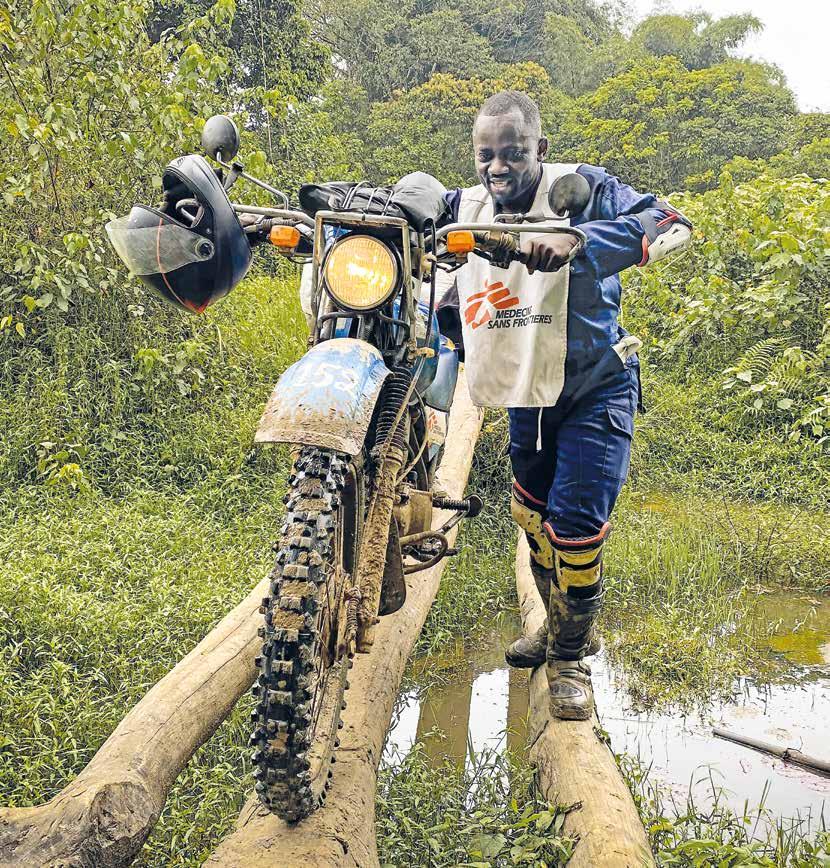
SITUATION REPORT
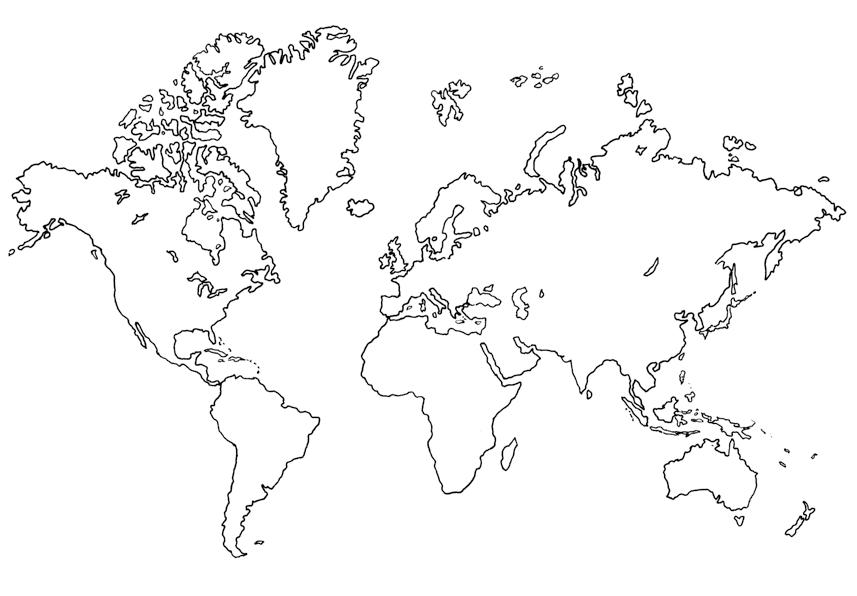
A mother brings her child to be vaccinated against diphtheria by MSF in Zinder, south Niger. Diphtheria is an infectious disease with symptoms ranging from mild to lifethreatening. The disease broke out in the Tesker and Gouré regions of Niger in August 2022, with 33 recorded deaths. MSF launched a mass vaccination campaign in January, vaccinating 600,000 children to protect them from the disease.
An MSF team unload medicines and supplies from a cargo helicopter in Rhoe camp for displaced people in Ituri province, in northeast Democratic Republic of Congo. Some 70,000 people live in dire conditions in this camp after fleeing violence in the region. MSF provides medical care and water and sanitation services in the camp.

Nineteen-year-old Fatima Djidda lies in a tent in Guilmey camp for displaced people in Chad while her sister, Haoua, holds a prescription for drugs to alleviate Fatima’s stomach pains. Both sisters lost their home and all their possessions during major flooding in the Ndjamena region in the last three months of 2022, which displaced hundreds of thousands of people and destroyed 465,000 hectares of crops. MSF launched an emergency response, running mobile clinics and providing water and sanitation services.
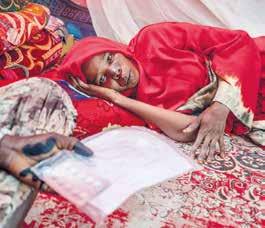
600,000 Number of children vaccinated against diphtheria by MSF in Niger in January

SUDAN: BREAKING NEWS

Intense fighting has been taking place between the Sudanese Armed Forces (SAF) and the Rapid Support Forces (RSF) in Khartoum and other parts of Sudan since 15 April. MSF staff are treating the wounded at the MSF-supported South hospital in El Fasher, North Darfur. MSF project coordinator Cyrus Paye describes the situation in El Fasher on 21 April.
maternity hospital that we began to support last year to help reduce the high rates of maternal mortality in the region. However, since the fighting began, we have had to repurpose the hospital to make it possible to treat the wounded.
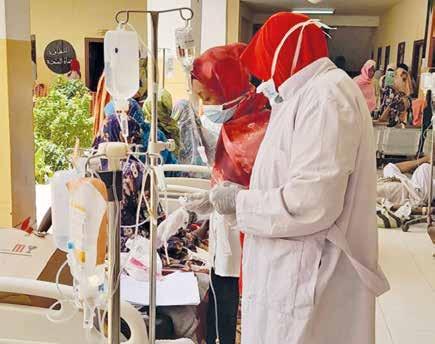
MSF’s Jean Heureux and Selene Manga take a break during an evening treating people injured during protests in the Peruvian capital, Lima, in January. MSF mobile teams set up medical posts in areas where protestors had gathered. In the first week they treated 73 people suffering from gunshot and pellet wounds, teargas poisoning and psychological distress.
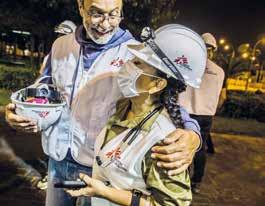
“There is currently heavy fighting here. We are still hearing gunfire from our compound as I speak. It is very unsafe because of the shooting and the shelling – there have been large numbers of civilian casualties.
We have received 279 wounded patients since the fighting began on Saturday [15 April]. Tragically, 44 have died. The situation is catastrophic. The majority of the wounded are civilians who were hit by stray bullets; many of them are children. They have fractures caused by bullets, or they have gunshot wounds or shrapnel in their legs, their abdomen or their chest. Many need blood transfusions. There are so many patients that they are being treated on the floor in the corridors because there simply aren’t enough beds to accommodate the vast numbers of wounded.
Until last weekend, South hospital had no surgical capacity. It was a
All other hospitals in the city have had to close due to their proximity to the fighting, or because staff are unable to reach them due to the intensity of the conflict. We were able to reach the hospital to restock it on Tuesday, when there was a lull in the fighting, but there are only enough medical supplies to last another three weeks.
Currently, within Sudan, nothing can move. The airports across the country have all been closed since the fighting began and there is fighting in the streets, so we cannot get more supplies in.
The current team are overwhelmed. They have been working round the clock. We are exploring options to bring supplies and experienced trauma surgeons into the country, but currently this is not possible.
It is critical that we are able to gain access to all health facilities across the country. This is what will save people’s lives.
That, and a guarantee from the warring parties that they will spare civilians’ lives.”
3 2 4 1
3. CHAD
1. NIGER
4. PERU
600 Average number of medical consultations conducted per week by MSF in Rhoe camp, Democratic Republic of Congo
2. DEMOCRATIC REPUBLIC OF CONGO
Philomène Franssen/MSF
Fausto Podavini
Mohamed Gibreel Adam/MSF
Max Cabello Orcasitas
2 DISPATCHES SUMMER 2023 3
Mariama Diallo/MSF
READ MORE AT MSF.ORG.UK/SUDAN
DISASTER AT 4 AM
ON 6 FEBRUARY 2023, MAGNITUDE 7.8 AND 7.6 EARTHQUAKES STRUCK SOUTHEAST TÜRKIYE AND NORTHWEST SYRIA , RESULTING IN 56,000 DEATHS AND WIDESPREAD DESTRUCTION. MSF TEAMS LAUNCHED AN IMMEDIATE RESPONSE. THIS IS THEIR STORY...
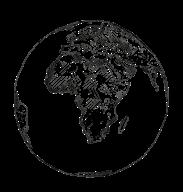
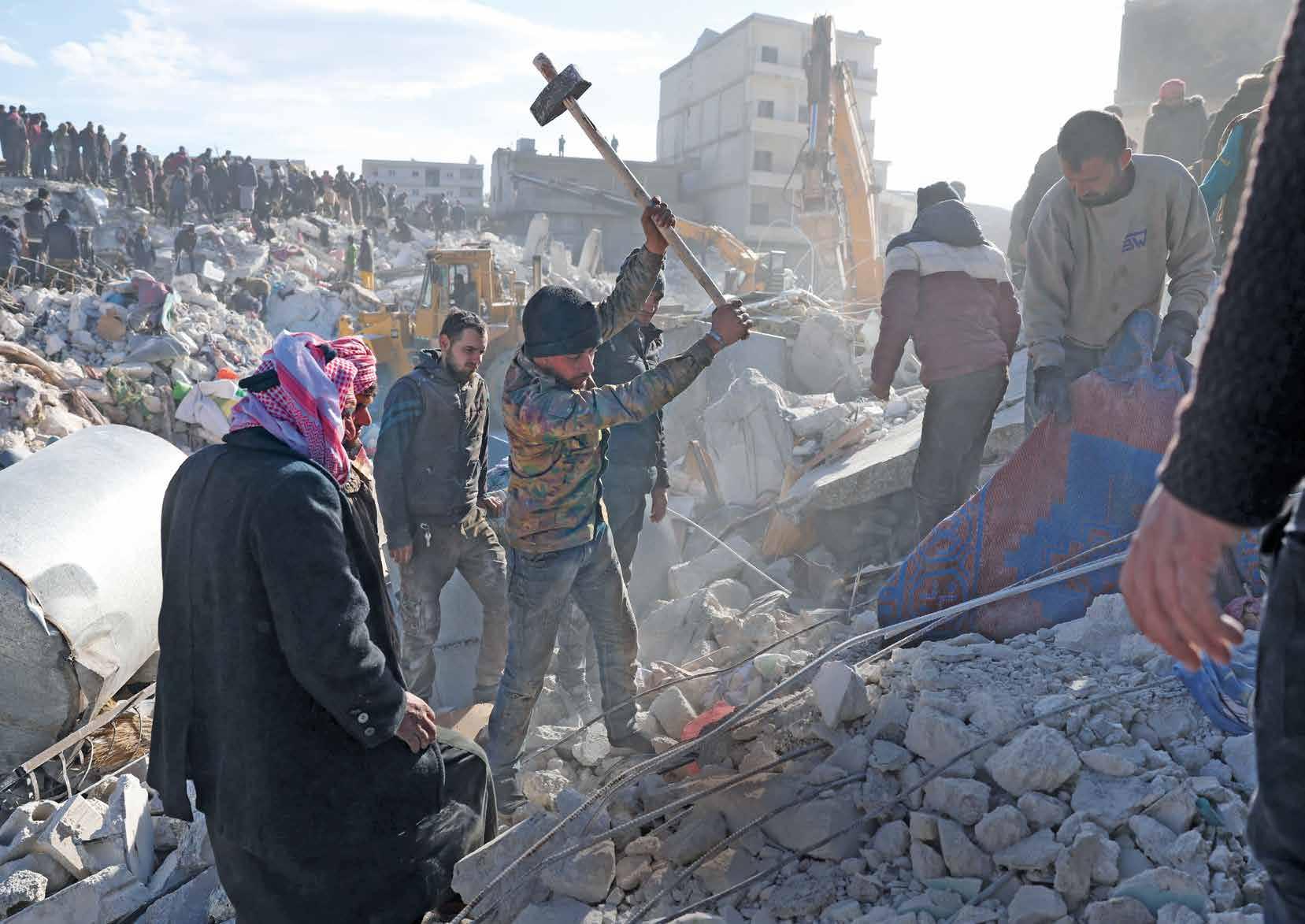
TÜRKIYE/SYRIA PHOTOGRAPHY OMAR HAJ KADOUR ABDUL MAJEED AL QAREH
4 DISPATCHES SUMMER 2023 5
AHMED RAHMO IS AN MSF PROJECT COORDINATOR. WHEN THE FIRST EARTHQUAKE STRUCK, HE WAS IN THE TURKISH CITY OF GAZIANTEP, 37 KM FROM THE QUAKE’S EPICENTRE.
“I woke up at around 4 am because the whole house was shaking. All the furniture was moving, thrown from left to right. It was terrifying. We rushed together and managed to get out of the house safely.
The whole time, all I was thinking about was my family: how do I protect the life of my children?
I know that hundreds and thousands of mothers and fathers across Türkiye and Syria were all thinking the same thing at that moment. So many have lost family members and so many are in pain.”
AISHA MAHMUD * IS AN MSF MIDWIFE FROM THE SYRIAN CITY OF AZAZ.
“When the earthquake struck at 4.17 am, my family and I were asleep. We felt the building shaking above us. We live in a five-storey building – we felt it shaking above our heads.
At first, we didn’t know what was happening, but after about 10 seconds we realised it was an earthquake. I yelled at my husband to get our two-year-old daughter Lareen. Our two other children were in their bedroom. I ran to wake them up. We made our way out to the street, not knowing what was happening.
My neighbour was screaming. She’s a mother of two and her husband wasn’t around. My husband picked up her son and we helped her get out. Our neighbours on the upper floors threw their kids down for us to catch them. Everyone was throwing their kids. We caught them and helped them out of the building.
Outside, we looked around us in complete shock. Our tears were mixed with blood. We didn’t know what was happening.”
SAMAR KHALED* IS AN MSF HEALTH EDUCATOR LIVING IN AZAZ, NORTHWEST SYRIA.
“I was at home with my husband, son and daughter. We live on the second floor. We were asleep when the earthquake happened. My husband felt it and woke me up. We ran out of the house in our pyjamas, barefoot and terrified. People were crammed and running in crowds. We could no longer feel anything other than terror. My children were shaking in front of me. We had no clue what needed to be done. Should we move away from the buildings? We had to make sure our relatives were safe, but our building was toppling and swaying before us. It felt like the end of the world.”
AISHA MAHMUD
“I realised I should be saving people. Some people had stayed in their buildings, others might have had their homes collapse over their heads. I ran into the street, barefoot. My husband was shouting at me to come back: ‘Aisha, where are you going? Come back here!’
I refused. I couldn’t stand still when so many people needed help. ‘There might be people trapped under the rubble,’ I called back. ‘I’m a medic so I need to help.’”
MOHAMMAD DARWISH IS DEPUTY DIRECTOR OF MSF’S ATMEH HOSPITAL, NEAR SYRIA’S BORDER WITH TÜRKIYE.
“We quickly understood that we were facing a catastrophic situation. We launched our emergency plan less than three hours after the first earthquake and put our staff on alert. The hospitals are full of wounded and the needs are immense. We immediately opened our logistics warehouses and distributed hundreds of essential items, but it is not enough.”
Main picture Rescue teams dig through the rubble of a collapsed building in Idlib province, northwest Syria.
MSF trucks deliver relief items to a shelter for families made homeless by the earthquakes near Tal Ammar in Syria’s Idlib province.
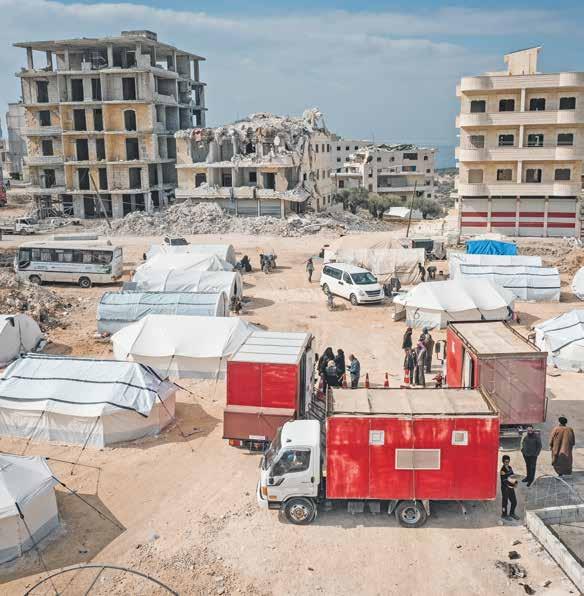
Five days after the earthquakes, Dr Samih Kaddour (right) treats an injured survivor in Aqrabat hospital, northwest Syria.

AHMED RAHMO
“In Syria we’ve had 12 years of war and the situation was already desperate. Our teams are supporting eight different hospitals in the Idlib area and have sent emergency doctors and nurses to hospitals treating the injured. We’ve deployed our ambulances and dispatched staff to reinforce overwhelmed medical teams. We’ve been providing people with fuel, winter kits, blankets and mattresses. We are doing what we can, but it’s a drop in the ocean. The needs are so great. We need tents. We need places for people to stay. We need clothes, we need water, we need food, we need everything.”
DR MOHAMMAD ZAITOUN IS A SURGEON WORKING IN NORTHWEST SYRIA.
“I went to a hospital located near the border with Türkiye. There were many wounded and the medical staff were exhausted. I spent most of the time in the operating theatre. We’d never witnessed such an influx of wounded, except during bombings or after massacres.”
AISHA MAHMUD
“At 1.24 pm we felt the massive aftershock. The hospital building is made of metal panels so could have collapsed at any moment. The injured rushed to get out of the hospital. Mothers, children, everyone, they were running for their lives. I saw a pregnant woman who was about to give birth helped out of the building. It was very frightening.
That day we received more than 50 injured people, who arrived at the hospital from all regions. All four operating theatres were at capacity. The rooms were covered in blood. The surgeons were performing osteotomies [bone-cutting procedures] and laparoscopies [abdominal surgery].
There was a huge shortage of equipment and the surgeons couldn’t carry out all the osteotomies required – they had to refer patients to other hospitals for surgery.
There was also a major shortage of coffins and body bags. The number of dead bodies was huge: women, children, elderly people...”
DR SAMIH KADDOUR IS THE DIRECTOR OF AQRABAT HOSPITAL, IN SYRIA’S IDLIB PROVINCE.
“All the hospitals were overwhelmed, including ours. The MSF teams were the first to help us and to share their resources. They gave us materials and helped to make casts and sterilise wounds. We received 800 people in the emergency room, 250 of whom needed surgical treatment. Even today [11 February] the wounded continue to flow in.”
6 DISPATCHES SUMMER 2023 7
“We didn’t know what was happening”
AISHA MAHMUD
“One man had seen the bodies of his wife, kids and parents brought out from under the rubble. He couldn’t handle it and was in a state of shock. He couldn’t grasp that his whole family had been buried under the rubble. Every half an hour, we received another member of his family: his son, his father, then his brothers. He lost more than 13 family members. And he wasn’t the only one.
We tried to relieve the pain of the children as much as we could. We took them to the nursery room to keep them away from the blood and harsh sights of the hospital. That’s all we could do.”
RICARDO MARTÍNEZ IS A LOGISTICS COORDINATOR AND HEAD OF ONE OF THE FIRST MSF EMERGENCY TEAMS TO ARRIVE IN TÜRKIYE FOLLOWING THE EARTHQUAKES.
“The first thing we do in these situations is to identify the most neglected places, where least aid has reached. We headed for the city of Adiyaman, but the most direct road from the airport had been damaged so we went the long way round.
My first impression of the city was of chaos. Search and rescue teams were working non-stop to find survivors. People were taking turns to wait next to collapsed buildings, hoping to find their loved ones alive or at least to find their bodies so that they could have a dignified burial and not be taken to a common grave.
Hundreds of buildings had been completely destroyed, while many of the remaining buildings had cracks. People were afraid of going back to their homes because of the aftershocks.”
ALI IS A 43-YEAR-OLD MAN FROM THE TURKISH CITY OF ADIYAMAN.
“I’ve lost my whole house, I’ve lost the car. Our family of five are sleeping in a relative’s car. We’d lived in our house for 17 years – we built it ourselves. We’ve lost everything we built throughout our lives. We are getting some aid from various places but we urgently need a tent. Without any money, we can’t think of going anywhere else.”
MOHAMMED* IS AN MSF DRIVER WHO WAS WORKING IN ATAREB, SYRIA, WHEN A RESCUE OPERATION TOOK PLACE.
“We saw a mother being taken out of the building, dead. But then the rescuers lifted a child from under the rubble who was alive and they handed him to the ambulance. The ambulance was leaving when they found another child, so they stopped the ambulance and then they found a third child. The people were cheering with happiness. They said they couldn’t take out the mother and the kids for two days, but at least the children were alive. They came out one after the other, like a miracle.”
AHMED RAHMO
“One month on and many displaced people still have no shelter, food, clean water or medical assistance. Many people have lost their homes and jobs, they have lost relatives and their loved ones and are sad, traumatised, anxious and uncertain about the future. More must be done.
This terrible experience has been shared by so many families in Türkiye and Syria. Death has felt very close to us all. But our teams are determined to do all that we can to help people in desperate need.”
*Some names have been changed.
In the immediate aftermath of the earthquake, MSF teams – who were already working in northwest Syria – immediately began treating patients and delivering essential supplies.
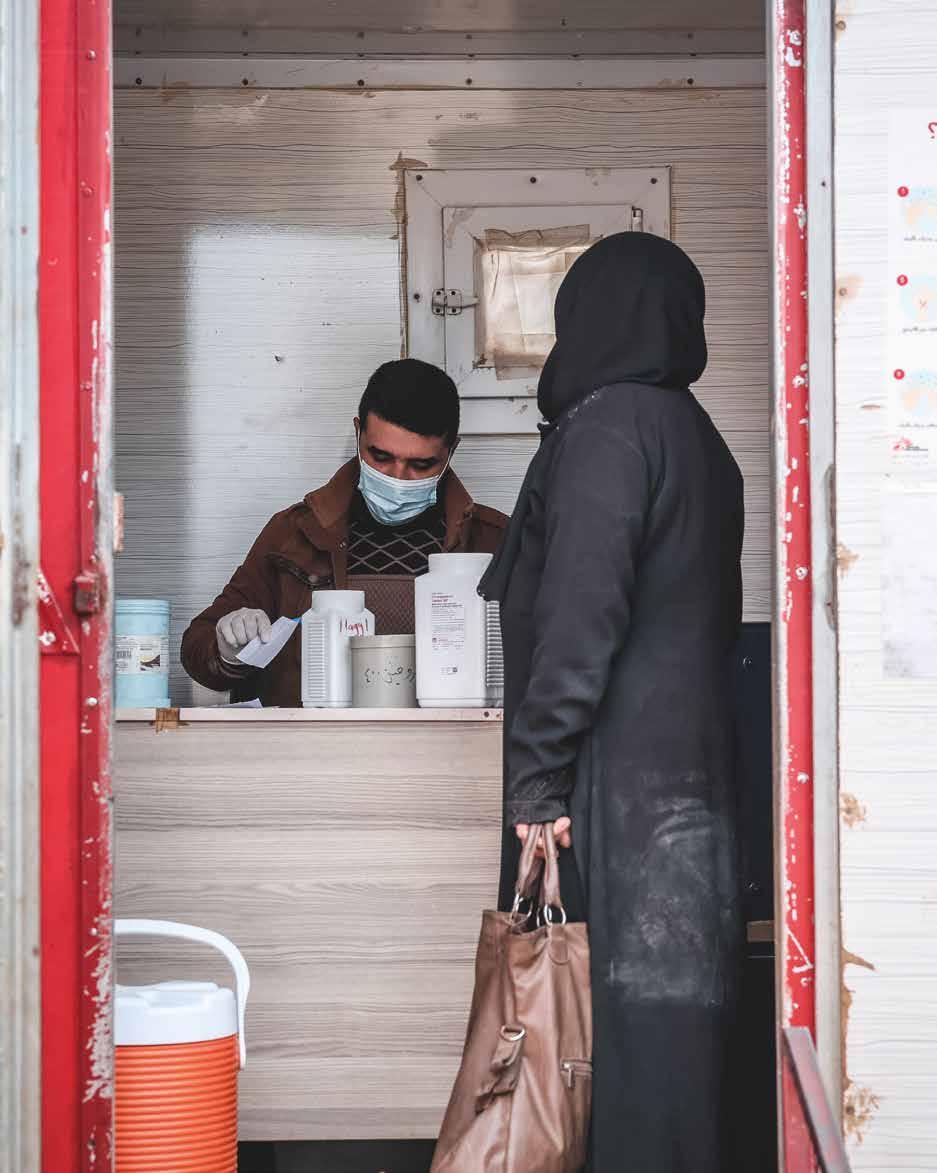
In Syria as of 27 March
• Medics in hospitals supported by MSF have treated more than 7,600 injured people.
• We have sent medical staff to support overwhelmed hospitals and have set up triage tents for the wounded.
• We have run 13 mobile clinics and treated 23,790 people.
• We have donated 35 tonnes of essential medical supplies to 38 hospitals and clinics, including emergency trauma and surgery kits, medicines, lab equipment and blankets.
• Our ambulance teams are transporting people in need of medical care to hospitals.
• Our teams have distributed 84,810 kits of essential items, including food, blankets and hygiene supplies, to people left homeless by the earthquakes in Aleppo and Idlib provinces. In Türkiye, we are working in partnership with different local and civil society organisations to provide much-needed humanitarian and relief assistance.
SUMMER 2023 9
“We need tents. We need places for people to stay. We need clothes, we need water, we need food, we need everything.”
8 DISPATCHES
A woman visits an MSF mobile clinic for earthquake survivors in Salqin, in Syria’s Idlib province.
A different kind of emergency
WORKING IN OLD FANGAK , A REMOTE TOWN IN SOUTH SUDAN’S JONGLEI STATE, DR TIM HAMMOND MANAGED SOME DIFFICULT CASES, INCLUDING MANY PEOPLE WITH GUNSHOT WOUNDS. BUT THE PATIENT HE WILL NEVER FORGET WAS FACING A DIFFERENT KIND OF EMERGENCY…
ld Fangak is a small town on an island in a remote area called the Sude, a vast swamp in the north of South Sudan. Around 30,000 people live in Old Fangak itself, but around it are dozens of smaller islands with their own little villages.
There are no cars or trucks in this area – canoes and boats are the only means of transport. However, frequent violent clashes make travelling by water difficult and sometimes dangerous.
Without MSF’s hospital, some of our patients would have to travel for a week by canoe to reach a medical facility. Even with motorboats, it still takes us five hours to transfer a patient to the nearest hospital with an operating theatre — if we can get permission to pass the numerous military checkpoints. That’s a long time in an emergency.
Martha arrived at the hospital struggling to breathe. Her worried husband told us she had given birth to her first baby about two weeks previously and everything had seemed fine. But that day she had suddenly started gasping for air. Thankfully they lived in Old Fangak and had been able to rush to the emergency room without a long journey by boat.
Martha had no fever or other signs indicating an infection such as pneumonia, and the basic blood tests we could do ruled out malaria and several other causes.
We had no X-ray or scans available, but we concluded that Martha likely had a pulmonary embolus, a clot which blocks the blood supply to the lungs, causing acute pain and shortness of breath. As blood clots more easily during and just after pregnancy, women are particularly at risk at this time.
One of the major risks of pulmonary embolus is heart failure. Martha was already showing worrying signs that her heart was struggling to pump blood to her lungs against the resistance of the blocking clot.
We started her on anticoagulant medication, or ‘blood thinners’, to help prevent the existing clot from getting bigger and new clots from forming. It would buy us time while her body worked to break up the clots in her lung, but that could be a long process…
As well as the anticoagulants, we put Martha on drugs to support her heart and help with the pain, as well as the highest concentration of oxygen available. Her condition was critical.
At this point Martha’s husband asked if she could be transferred to Juba, the capital of South Sudan. Juba has multiple health facilities, while we were a small hospital on a very remote island – it seemed to make sense.

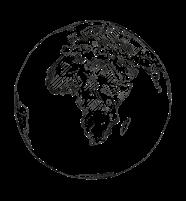
But a transfer would involve huge risks. The distance as the crow flies is almost 300 miles, most of it over
water. The airstrip at Old Fangak was flooded, and the nearest operational airfield was five hours away by boat. A phone call established that there was no appropriate power supply for an oxygen concentrator in the aircraft. And at altitude there is less oxygen in the air, putting even greater stress on a failing heart.
After much discussion between Martha, her husband and the medical team, we agreed that, despite the severity of her symptoms, it would be safer for her to stay with us. We had the medications, the oxygen and the team.
Slowly, slowly, Martha began to improve. Her pain lessened, her breathing rate gradually slowed and she even started eating a little. We were able to reduce the amount of oxygen she was on. After another week she was able to get out of bed and
take a few tentative steps. And another week later, she came off oxygen completely.
The next day came the moment we had all hoped for so desperately: after more than three weeks, Martha walked out of the hospital, accompanied by her husband and her five-week-old baby. Life for people living around Old Fangak can be extremely tough. People’s medical needs are huge, and the team at the hospital work incredibly hard to provide a high level of care. Without the care, expertise and medical supplies provided by the MSF team in Old Fangak, people like Martha would have nowhere to turn in a medical emergency.
We saw Martha and her baby in the outpatient clinic a week later, both looking well and happy. She will need to continue taking some of her medications for a while but should make a complete recovery.” Names have been changed.
Dr Tim Hammond has worked for MSF in Kenya, Iran, South Sudan and Ukraine. When not on MSF assignments, he likes spending time with his family and sailing in Chichester harbour.
10 | DISPATCHES SUMMER 2023 11
SOUTH SUDAN WORDS TIM HAMMOND PHOTOGRAPHY FLORENCE
MIETTAUX
O
Accompanied by her brother Jal, Nyamal Duop Gatluak returns to Old Fangak on an MSF flight after receiving treatment for a fracture at MSF’s hospital in Bentiu.
“Without MSF’s hospital, some of our patients would have to travel for a week
“
by canoe to reach a medical facility.”
‘I love the science of the bake’
LABORATORY SCIENTIST, PROJECT COORDINATOR, BAKE OFF CHAMPION… CHARITY KAMAU IS A WOMAN OF MANY TALENTS. SHE DISCUSSES HER CAREER WITH MSF AND WHY FRONTLINE HUMANITARIAN WORK WILL ALWAYS FEEL LIKE HER TRUE HOME.
y name is Charity Nyakio Kamau. I’m project coordinator for MSF’s hospital in Bentiu, a camp for displaced people in South Sudan.
I’m also an avid baker and winner of the Great Kenyan Bake Off Season 2. I’ve been working with MSF for a long time.

I started as a lab technician in Kenya in 2006, supporting MSF’s work on crises such as HIV, tuberculosis and malnutrition. Lots of people don’t realise that MSF teams include lab specialists, but they are key to diagnosing patients and determining the right treatments.
After Kenya I moved to MSF headquarters in Amsterdam to work as a lab advisor, covering up to 12 countries at a time. If a lab or clinical team had a question or a problem, I was the person they would reach out to for advice.
But after a while in Amsterdam, I started to feel very far away from where I’d started my journey with MSF. So I decided to come home. And for me, ’home’ meant being part of a frontline humanitarian team again. This time, I decided to use the skills I’d developed supporting and managing teams in a new way: by becoming a project coordinator. Project coordinators are responsible for everything from strategy to security, staffing to finance.
My first assignment was in Nigeria, where I joined the team at a hospital for children with
noma – a disease that’s strongly associated with poverty and malnutrition. Malnutrition weakens the immune system, making children more vulnerable to noma, while the facial deformities caused by the disease make it difficult for children to eat.
I remember one little boy who was very sick. He needed facial surgery as part of his treatment, but he was so weak that he had to stay in hospital for two weeks, being fed a special diet, before he was strong enough for the operation. During that time, the team spoke to his family about the different foods available to them. We showed them how to prepare food that would be nutritious and also soft enough for their child to eat after such extensive surgery.
His father told me how worried the family had been about their sick, withdrawn son who didn’t play like the other children.
A few months after the little boy had his surgery, his father brought him back to the hospital for a check-up. I asked how he was doing.
‘He does not stop playing!’ said the father. ‘He plays so much. What did you do to him?’
‘First you said he wasn’t playing enough,’ I said, ‘now you’re complaining he’s playing too much!’
We laughed about it, but it really stayed with me as an example of how humanitarian work is not only about preventing death, but also about seeing the life come back into people. Nutrition is so often an important part of that.
Feeding people is my love language. My friends signed me up for the Great Kenyan Bake Off, despite my protests. I did not think I was good enough.
In the competition, I made sure that all my recipes used indigenous Kenyan ingredients, prepared in modern ways. These were foods that were said to be ‘for poor people’ when I was growing up, but are actually really sustainable.
A recipe is similar to a standard operating procedure in the lab: it’s all about chemical reactions taking place at a precise temperature and pH. I love the science of the bake, but also the creativity it allows you to explore. Baking can also be therapy – it helped me through the grief of losing my sister.
As an MSF project coordinator, one of your jobs is to keep up the spirits of your team, even when circumstances are challenging. Being a baker helps a lot!”
LISTEN TO CHARITY AT MSF.ORG.UK/CHARITY
CHARITY’S CARROT CAKE WITH WHITE CHOCOLATE AND CREAM CHEESE FROSTING
“A good cake will bring many smiles back after a hard week in the hospital. Although I often have to improvise the ingredients, this is one of my favourites!”
FOR THE CAKE
240g flour
2 tsp baking powder
1.5 tsp baking soda
1 tsp salt
2.5 tsp cinnamon
150g sugar
4 eggs
385ml vegetable oil
1 tsp vanilla essence
100g desiccated coconut
600g grated carrots
100g pumpkin seeds
METHOD
1. Line or grease a baking tin.
2. Preheat the oven to 180 0 C.
3. Mix together the flour, baking powder, baking soda, salt and cinnamon.
4. In another bowl, beat the eggs, then add the oil, vanilla essence and sugar. Mix well.
5. Add the dry ingredients to the egg mixture in two batches. Mix well.
6. Fold in the desiccated coconut, grated carrots and pumpkin seeds.
7. Pour the batter into the tin and bake at 180 0 C for approximately 45 minuts.
WHITE CHOCOLATE AND CREAM CHEESE FROSTING

320g white chocolate
300g cream cheese
200g unsalted butter, at room temperature
1.5 tsp vanilla essence
300g icing sugar
METHOD
1. Melt the chocolate in a bowl above a simmering pan of water.
2. Beat the cream cheese with the butter until well combined.
3. Stir in the chocolate.
4. Sift in the icing sugar in batches, beating between each one.
5. Spread over the top of the cooled cake.
ENJOY!

12 | DISPATCHES SUMMER 2023 13
“
“Humanitarian work is not only about preventing death, but also about seeing the life come back into people”
STAFF PROFILE
Charity with the Great Kenyan Bake Off trophy.
Charity Kamau
TROUBLE IN PARADISE
THE CENTRAL PACIFIC ISLAND NATION OF KIRIBATI IS ONE OF THE MOST REMOTE LOCATIONS WHERE MSF PROVIDES MEDICAL CARE. MADE UP OF 32 ATOLLS SPREAD ACROSS 1.3 MILLION SQUARE MILES OF OCEAN, THE COUNTRY FACES AN ARRAY OF PROBLEMS LINKED TO RISING SEA LEVELS.

We talk to MSF’s Dr Jo Clarke about the challenges of providing medical care to people threatened by malnutrition and climate change.
Why did MSF send you to Kiribati?
“Late in 2022, Kiribati’s Ministry of Health contacted MSF with an urgent request for temporary support providing paediatric care. Their only paediatric consultant had landed a new job outside the country and they desperately needed somebody to lead the team. I arrived here in the capital, Tarawa, in January and have been working at Tungaru central hospital ever since.”
In photographs it looks like a dream location. But there’s more to Kiribati than sunshine and sandy beaches, right? “Yes, that’s right. Don’t get me wrong – it is beautiful here. Parts of this island are only 20 to 30 metres across and everywhere you look you’re surrounded by beautiful blue water. But that perfect image can distract from some of the very real problems faced by the people who live here. Kiribati has one of the highest mortality rates in the world for children under five, and we’re seeing increasing numbers of children with severe acute malnutrition.”
What sort of numbers are we talking about?
“We’re still collecting the data but, to give you an idea, our paediatric ward has 15 beds and, some days, 10 of the beds are filled with children with severe acute malnutrition. That’s significant in a country with a population of around 119,000. There is rarely a day when we don’t have malnourished children brought in here. And they’re just the ones we see and know about.”
What’s causing this rise in malnutrition? And are the parents affected as well?
“That’s the surprising thing. I’ve worked for MSF in South Sudan and Afghanistan, where I treated a lot of children for malnutrition. In both those places, many parents also appeared underweight. But here,
it’s almost the opposite. Adults tend to be overweight and there’s a real problem with obesity and type 2 diabetes. Initially it seemed strange to find malnourished children with obese parents. But the more you examine it, the more sense it makes.
Much of the food available here is imported, so it’s mainly tinned and processed food. Things like infant milk and fresh vegetables are very expensive because Kiribati is so remote. As a result, people’s diet isn’t great and children are not getting the nutrients they need.
Now some of that has to do with public health promotion, which needs to be addressed. But you can’t just tell people they need to eat a well-balanced diet when healthy, nutritious food is out of reach of most people. I saw a pumpkin for sale the other day
for US$45. One of my team saw a small cauliflower for sale for US$15. That’s a stupid amount of money. Who can afford that?”
Can people not just grow more vegetables? What about traditional sources of food?
“It’s become harder to grow food here, and this is where it’s difficult not to draw a stark connection between what’s happening in Kiribati and the impact of climate change. There has been a long-term drought, and there’s no disputing that sea levels are rising and storm tides are increasing. This is an atoll and we’re only three metres above sea level at the highest point. This means that more of the land is becoming unusable and more of the wells that people rely on for drinking water and agriculture have been affected by salination, making them brackish. Less land means that more people are living in overcrowded conditions here in the capital. Combined with the lack of fresh water, this means there’s an increasing problem with hygiene and sanitation, which has knock-on effects on people’s health.
Less land and more buildings also mean that more coconut trees and breadfruit trees – the traditional sources of food here – are being cut down. Just last week, four coconut trees were cut down in front of where we’re staying.
There’s an interlinked web of cause and effect here that’s having a really detrimental impact on people’s health.”

It sounds like a desperate situation.
“I don’t think there are any easy solutions. But good things are happening. One of the benefits of MSF being here is that we have really well-established guidelines for treating malnutrition and we’ve been able to roll them out here.
We had a nine-month-old boy at the hospital this week suffering from diarrhoea and severe dehydration. He was malnourished and was barely conscious. You have to be very careful treating a child in that condition. Giving them too much fluid too quickly can kill them. So we slowly gave him therapeutic milk and then, after a few days, added Plumpy’Nut [a peanut-based therapeutic food for treating malnutrition]. We worked with the parents, explaining to them what we were doing and what needed to be done.
Within about five days, he was a completely different child. His eyes were suddenly so big and he was smiling at everybody. Seeing something like that is a real morale booster for everybody – the staff, the parents, the wider community. It gives people hope.”
14 | DISPATCHES SUMMER 2023 15
KIRIBATI WORDS JO
CLARKE PHOTOGRAPHY NICOLETTE JACKSON/MSF
Dr Jo Clarke is an Australian paediatrician.
Old cars and rubbish sit alongside makeshift barriers built to protect against tidal surges near the village of South Tarawa.
MSF’S UK VOLUNTEERS
Afghanistan: Darran Martin, Nurse; Louis Dowse, Project coordinator; Meabh Ni Bhuinneain, Obstetrician Gynaecologist; James Lee, Doctor; Ciara Flood, Nurse
Bangladesh: Joy Clarke, Doctor; Nicodeme Zirora, Finance manager; Patrick Sharkey, Water and sanitation manager; Deborah Malden, Epidemiologist
Central African Republic: Eleanor Harvey, Pharmacist; Andrew Stevens-Cox, Hospital facilities manager; Mariana Goncalves, Water and sanitation manager; Caterina Quagliani, Programme implementor; Grainne Larkin, Doctor; Alison Antunes, Health promoter
Chad: Shannon Fluck, Logistician; Leah Kenny, Advocacy manager
Democratic Republic of
Congo: Mark Blackford, Finance coordinator; Philippa Tagart, Medical team leader
Ethiopia: Nijole Kymelyte Slapsinskaite, Nurse; Richard Maltman, Logistician; Victoria Parris, Doctor; Tria Rooney, Doctor; Michael Barclay, Project coordinator; Caroline Chestnut, Water and sanitation manager
Haiti: John Boase, Logistician
India: Angus De Wilton, Doctor; Claire Mason, Doctor; Nicole Hart, Deputy medical coordinator
Indonesia: Roger Teck, Head of mission
Iraq: Moiz Alibhai, Anaesthetist
Jordan: Yolanda Vazquez
Suarez, Activity manager
Kenya: Paul Banks, Procurement manager
Kyrgyzstan: Rebecca Welfare, Deputy head of mission
Lebanon: Caroline Jones, Doctor
Mexico: Lindsay SoleraDeuchar, Activity manager Mozambique Jill Powis, Finance & HR manager
Myanmar: Corinne Linnecar, Humanitarian affairs officer; Zoe Bennell, Field communications manager
Netherlands: Edward Taylor, Deputy head of mission
Nigeria: Clare Atterton, Head nurse; Moses Soro, Finance & HR manager
Palestinian Territories: Helen Ottens-Patterson, Head of mission; Lucia Alvarez Marron, Nurse
Russia: Sarah Clowry, Advocacy manager
Sierra Leone: Molly Brammer, Midwife; Clare Templar, Clinical mentor
Somalia: Dana Krause, Head of mission
South Sudan: Erin Lever, Midwife; Rachel Folwell, Doctor; Gillian Murphy, Project manager
Sudan: Elizabeth Wait, Health promoter; Rowena Neville, Doctor; Melissa Buxton, Nurse; Matt Cowling, Advocacy manager; Olivia Millward, Nurse
Syria: Elizabeth Harding, Head of mission
Tajikistan: Philippa Lowth, Nurse; Ruth Moore, Finance & HR manager
Ukraine: Thomas Marchese, Logistician; Emily Hewitt, Community engagement manager
Uzbekistan: Kevin O’Kane, Project coordinator
Venezuela: Sylvia Kennedy, Nurse
Yemen: Rachel Coyle, Midwife supervisor
Zimbabwe: Michael Parker, Project coordinator
Cover image: An MSF team member pushes his motorbike across a river on his way to the village of Kalole in South Kivu, Democratic Republic of Congo. Reaching patients in this remote area can take up to eight hours by motorbike on poor roads. © Michel Lunanga/MSF
Gulnaz plays with her daughter in Peshawar, Pakistan, while waiting for treatment from MSF for cutaneous leishmaniasis, a severe skin infection transmitted by the bite of sandflies.
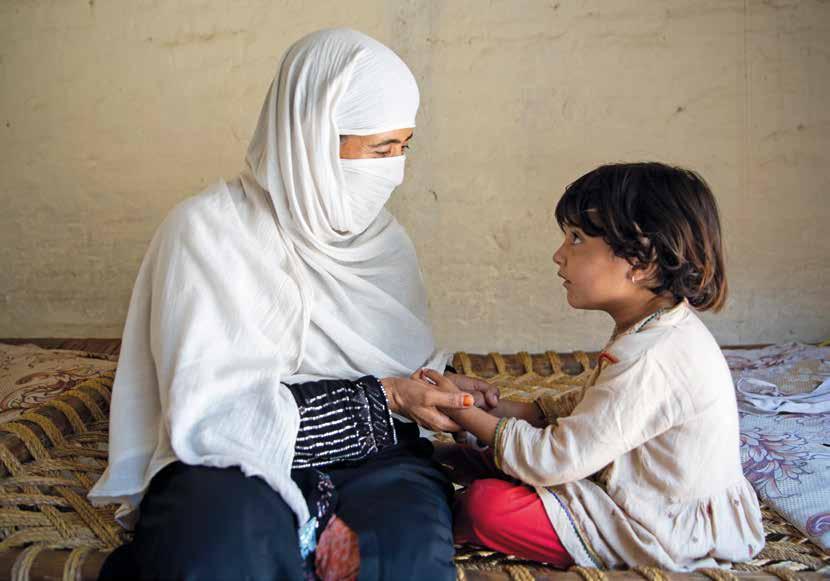
Médecins Sans Frontières/Doctors
Without Borders (MSF) is a leading independent humanitarian organisation for emergency medical aid. In more than 70 countries worldwide, MSF provides relief to the victims of war, natural disasters and epidemics, irrespective of race, religion, gender or political affiliation. MSF was awarded the 1999 Nobel Peace Prize.
TEL 020 7404 6600
ADDRESS Médecins Sans Frontières, Chancery Exchange, 10 Furnival Street, London EC4A 1AB
@msf_uk msf.unitedkingdom
Charity Registration Number 1026588
ABOUT
Dispatches is written by MSF staff and sent out quarterly to our supporters to keep you informed about our medical work around the world, all of which is funded by you. Dispatches gives our patients and staff a platform to speak out about the conflicts, emergencies and epidemics in which MSF works.
It is edited by Marcus Dunk. It is printed on recycled paper and costs £0.76 to produce, package and send using the cheapest form of post. It is an important source of income for MSF and raises three times what it costs to produce. We always welcome your feedback. Please contact us using the methods listed, or email: dispatches uk@london.msf.org
SIGN UP TO EMAIL
Get the latest MSF news delivered to your inbox. Sign up at msf.org.uk/signup
MAKE A DONATION
You can donate by phone, online or by post. If possible please quote your supporter number (located on the top left-hand side of the letter) and name and address.
LEAVING A GIFT IN YOUR WILL
Have you thought of remembering MSF in your will? Any gift is welcome, however large or small. For more information, contact Shona Barnes at: shona.barnes@london.msf.org or call us on 020 7404 6600
CHANGING YOUR ADDRESS
Please call 020 7404 6600 or email: uk.fundraising@london.msf.org
CHANGING A REGULAR GIFT
To increase or decrease your regular gift, please call us on 020 7404 6600 or email: uk.fundraising@london.msf.org with your request. Please also get in touch if your bank details have changed.
If you would like to stop receiving communications from us, please contact our Supporter Care team on 020 7404 6600 or email uk.fundraising@london.msf.org and we’ll be happy to help. Thank you for your support.
Saiyna Bashir





















